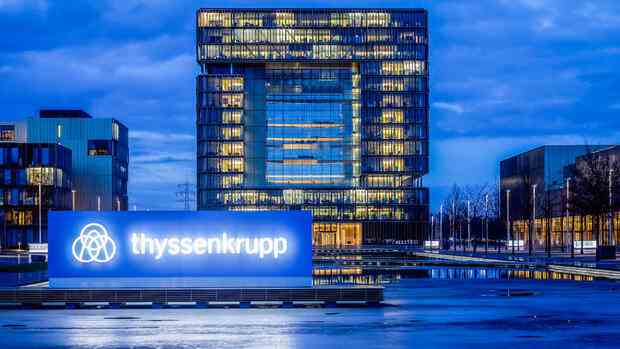According to the company’s forecast, earnings for the year as a whole will fall to a high three-digit million figure.
(Photo: imago images/Rupert Oberhäuser)
Dusseldorf Falling steel prices and price pressure in the materials business have caused earnings at the Thyssen-Krupp industrial group to fall. The company announced on Tuesday that earnings before interest and taxes (EBIT), adjusted for special effects, shrank by a third in the first quarter of the financial year to 254 million euros.
“We have seen a destocking with falling prices in the materials area,” explained CFO Klaus Keysberg at a conference call with journalists. Throughout the industry there were high inventories of stainless steel, industrial minerals and plastics due to increased prices. As demand weakened, corporations had to scale down sales or even reduce inventories around the world.
As a result of the declining margins in the Materials Services division, the area only achieved an operating profit of 20 million euros in the quarter – after 219 million in the same period last year.
However, Thyssen-Krupp confirmed the outlook, according to which adjusted EBIT for the full year will fall to a value in the mid to high three-digit million euro range, after a profit of 2.1 billion euros most recently. In the current quarter, however, the operating result will fall compared to the first quarter, according to the presentation on the quarterly balance sheet.
Overall, however, the company sees a stable and robust start to the year. “Since the turn of the year we have seen the first signs of rising spot prices and a slight increase in volume,” said Keysberg. This is interpreted as a sign of restocking, i.e. that customers are upgrading their stocks and “want to be able to deliver by the end of the year”. The Chief Financial Officer expects more momentum in this area, especially from the spring.
Keysberg said it was difficult to estimate how the economy would develop further. The group is driving improvements in performance and the conversion. ThyssenKrupp boss Martina Merz wants to set up the steel division independently and list the hydrogen subsidiary Nucera on the stock exchange. Due to the uncertain economic development, she recently put on the brakes.
“Just one push of a button”: Partial IPO of hydrogen subsidiary still planned
However, Thyssen-Krupp is still planning the partial IPO of Nucera, according to Keysberg. The only reason why this hasn’t happened yet is the uncertain market environment. “If we think it’s good, we’ll do it,” said the manager. This can happen every day: It only takes one push of a button to do this.
Against the background of the carve-out of the steel business, the group is waiting for approval of the funding applications from the European Union (EU). Thyssen-Krupp Steel Europe wants to put the first plant into operation in Duisburg as early as 2025, with which steel can be produced in a more climate-friendly manner. This will initially be operated with natural gas and from 2027 increasingly with hydrogen. The group estimates the costs at around one billion euros.
“We expect the EU decision in the first half of this year,” says Keysberg. With the approvals, the group is a lot closer to an independent structure of the steel business.
In contrast to the materials trade, the steel business was still able to push through high prices in the first quarter. “Due to the longer-term contracts, the segment was only slightly affected by the falling spot market prices,” it said. Despite sharp increases in raw material and energy costs, the division’s adjusted EBIT improved by 42 percent to EUR 177 million.
“Clear picture” of corporate restructuring on the board
When asked if the company’s board of directors was no longer pulling in the same direction, Keysberg replied: “We have a clear picture on the board of how we are shaping this transformation and we are on the way. If there are different perspectives here and there, then that is not only normal, but also desirable.”
Of course, the speed of implementation is an issue, says Keysberg. “We said at the Annual General Meeting that we ourselves are not satisfied with it.”
Due to the sale of the elevator business, the group is still in a comfortable situation. “We have available liquid funds of 8.7 billion euros,” says Keysberg. However, the goal is not to use up the reserves, but “to generate something positive from this cash flow”.
The bottom line was that the entire group after third-party shares made a profit of 75 million euros in the quarter – a decrease of 29 percent. Free cash flow before mergers and acquisitions, which has received much attention in the market, was minus 365 million euros – an improvement after a minus of 858 million euros in the same period last year. The management confirmed that it is aiming for at least a balanced value both here and in terms of net profit in the financial year.
With agency material
More: CEO Merz encounters resistance with sales plans for steel
